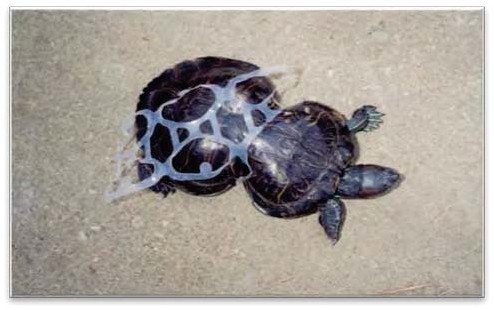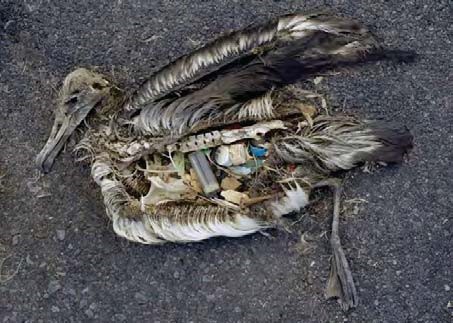![]()
The Cowrie – SIDS Times Magazine Fall 2017 Online Edition – Back to Table of Contents
“A Winner for Preventing Ocean Plastics Pollution”

PHOTO CREDIT- MISSOURI DEPARTMENT OF CONSERVATION
Ocean plastics have rapidly emerged as one of the most significant and fastest growing threats to marine ecosystems and the myriad services they provide to humanity. We now have a pretty good handle on the volume of plastics entering the ocean, between 8 and 20 million metric tonnes per year, with possibility to increase a further ten-fold by 2025 in a ‘business as usual’ scenario. Since the advent and subsequent explosive growth in plastics production starting in the early 1950’s, we have produced about 8 billion metric tons of plastic, the vast majority of it still in existence and a sizeable fraction, about 60 percent, either in landfills or the environment, including the ocean. That’s about one ton of plastic for every human being on earth – or
10 pounds of plastic for every pound of human! Only about 7 percent of the plastic every produced has been recycled so we remain a long way from truly ‘closing the loop’ on ocean plastics pollution.
We also know that rivers represent a major vector for introduction of plastics to the ocean, transporting some 1.15 – 2.41 million metric tons per year or between 6 – 30% of the total. We know that marine plastics can entangle marine mammals and turtles, damage coral reefs, cause ‘ghost’ fishing and be ingested by many organisms, from the smallest plankton to the largest whales. UN Environment estimates that marine plastics pollution causes economic damage of at least $8 billion per year. Because a sizeable fraction of plastics that reach the oceans from the land masses are moved into the huge central gyres in each of the major oceans (causing the so called ‘garbage patches’), many Small Island Developing States that lie in the path of these gyres receive a disproportionate ‘share’ of these wastes with associated damage to their economies and livelihoods, so vitally dependent upon clean oceans and coasts. One of the most common types of plastics found in the ocean and on beaches is polyethylene, or PET, which is the main polymer used for soft drink, bottled water and selected other containers.
In the US, Europe, Canada and Australia, one of the most successful strategies for closing the loop on PET (and aluminum and glass) bottle waste has been Container Deposit Laws (CDL), also known in the US as ‘bottle bills’. These apply a very simple but effective approach: each bottle a consumer purchases includes in its price a ‘deposit’, typically ranging from US 5 to 25 cents, which the consumer receives back when they return the bottle to a redemption center (usually a machine, or manual receipt and processing). In the US, where around ten states have CDLs with deposits ranging from 5-10 cents, recycling rates for PET bottles average 48%, vs. only 20% for non-deposit states. Not surprisingly, the highest rate (93%) is in Michigan with a 10 cent deposit. In Germany, a deposit equivalent to about US 28 cents delivers back 98% of all PET bottles for recycling; Netherland’s 28 cents deliver 95%. In sum, the basic economics of CDLs work as one would predict: higher deposits deliver higher returns.

PHOTO CREDIT: CHRIS JORDAN/US FISH AND WILDLIFE SERVICE
Studies in the US have demonstrated that CDLs have no discernible impact on the prices of beverages (compared to states without CDLs) nor on the range of consumer beverage choices. Most CDLs are designed such that the beverage companies and consumers pay the costs of administering the programs, not municipalities or taxpayers, e.g. application of the polluter pays principle, and these costs average only one to two cents per container. Studies in Hawaii, Canada and Australia and elsewhere have demonstrated that CDLs reduce local marine plastics pollution – and reduce greenhouse gas emissions, helping to mitigate climate change. Lastly, CDLs create jobs to support the various steps of collection, processing and remanufacturing; for example, Michigan’s CDL led to a net increase of 4,648 jobs.
While voluntary curbside recycling programs are also part of the solution, they are not sufficient; while the percentage of Americans with curbside recycling access rose from 15 to 64 percent between 1990 and 2010, PET recycling rates barely budged over that period (only one new bottle bill was added, in Hawaii). In addition, ‘single stream’ curbside recycling is more expensive and produces lower quality recyclables due to higher rates of contamination and residue, leading to lower recycling rates. Lastly, curbside programs don’t target or address beverages consumed away from home which can be a sizeable fraction, especially in cities – about one third of beverages sold in the US are consumed away from home.
In addition to the 10 US states, CDLs are in place or anticipated in most Canadian and Australian provinces, many European countries, and Israel. Interestingly, the only developing countries that appear to have taken steps to introduce CDLs are ALL SIDS – Fiji, Micronesia, Kiribati, Barbados, and Palau. Kiribati’s program (on both PET and aluminum) reduced landfill waste by 60%. SIDS like these are showing leadership and commitment in introducing innovative waste reduction strategies – but of course much more remains to be done especially in the countries whose waste often makes its way onto SIDS shores.

PHOTO CREDIT: UN PHOTO/MARTINE PERRET
In sum, Container Deposit Laws are a proven, cost effective, polluter pays strategy that can help countries and communities make important progress in reducing plastics pollution to the ocean and overall environment. To learn more about CDLs, visit websites such as www.container-recycling.org, www.bottlebill.org, www.reloopplatform.eu/ and others which have a wealth of useful resources. UNDP looks forward to working with its SIDS and other programme countries towards closing the loop on ocean plastics pollution.
By Andrew Hudson
Head, Water & Ocean Governance Sustainable Development Cluster
Bureau for Policy and Programme Support
United Nations Development Programme
Andrew.hudson@undp.org